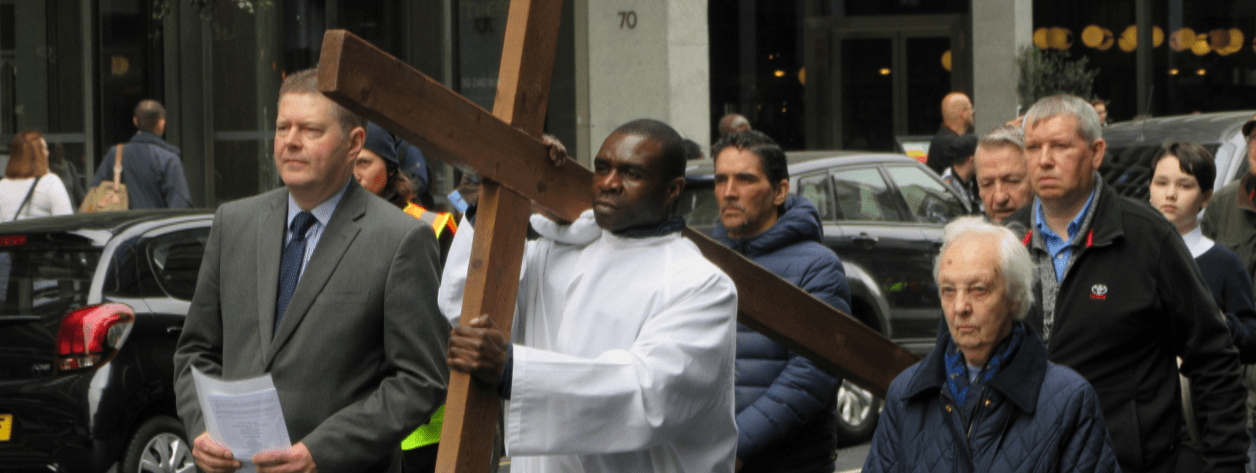By Mick Clarke, CEO of The Passage
Every Good Friday, at midday, a procession starts off from Westminster Central Methodist Hall. The ‘Crucifixion on Victoria Street’, as it has become known, unites Christians as they commemorate the Passion and death of Christ.
Several hundred people walk in silence from Methodist Central Hall, including Church leaders, along Victoria Street in central London to Westminster Cathedral and then finally back down Victoria Street to conclude at Westminster Abbey.
Leading this procession are people who are homeless and served by The Passage, with one carrying a large cross. It is a very moving experience to witness.
This year, as we were about to set off on the final stage of the procession from Westminster Cathedral to Westminster Abbey, I went to help the person carrying the cross get ready to set off. As I approached him he turned to me and said “thanks for helping me carry my cross”. For me, this one sentence summed up the mission of The Passage, and the role it plays in the wider mission of the Church.
The mission of The Passage is to provide resources which encourage, inspire and challenge homeless people to transform their lives. The Passage runs Europe’s largest Resource Centre for homeless people. Hundreds of people a week use the Centre to access basic services (such as food, showers, clothing etc) as well as housing advice, health services and assistance to get into education or employment. The Passage also provides accommodation services. Passage House works with those coming straight off the streets in order to provide shelter and stabilise their situation, and Montfort House prepares clients to move out of homelessness and into their own flat, as well as community and homelessness prevention schemes.
At The Passage, we believe that any person is only a couple of steps away from becoming homeless and we aim to address the root causes that have led to someone becoming homeless: family breakdown, mental health or addiction issues, etc. If these issues are not addressed, it is hard to ensure that a homeless person can break out of homelessness for good. The litmus test for The Passage is ensuring that those people we resettle into their own permanent accommodation can sustain it; that’s where our Home for Good programme comes in, ensuring that those resettled have the support of volunteers from their new local community to help them keep their accommodation and not end up back on the street.
The Passage has a Vincentian ethos, in that it takes its values from St. Vincent De Paul. St. Vincent saw that faith requires a practical demonstration in doing good amongst the poor. Vincent was intensely motivated by the Christian faith, and took on board the inclusivity of the Christian message. He looked at the life of Jesus and saw his concentration on those in need, never leaving suffering people the way he found them and constantly transforming the life of the poor. He identified the death of Jesus with all the sufferings of the poor. He literally took the passage in St. Matthew’s Gospel where Jesus says: “whatever you do to the least of these brothers and sisters, you do to me”. For Vincent, this meant that every human person, and particularly the poor, has God living in them. Every individual was a whole person, with their individual story, and in serving their practical needs attention must also be given to their spiritual and emotional being. Each person therefore must be treated with total respect, with immense dignity, with gentleness and kindness and, in the manner of Jesus, be helped to transform their lives at every opportunity.
For me this is what the mission of the Church is about; to be a visible sign of justice and compassion in a world that seems, at times, to value materialistic gain over the intrinsic value of the human person.
That homeless person, when thanking me for helping carry the cross, was thinking very much in the literal sense as they led the procession. However, the deeper meaning reflects on the work The Passage does; helping to address the issues that have led to homelessness in the first place, helping people overcome those issues and bring them to a place of recovery.
Whilst most of us will never (hopefully) experience the trauma of homelessness, we may experience a sense of inner homelessness – times of bereavement, loneliness, and depression. At times some people feel they are without hope. We all have to carry our own cross at certain times in our life; if we are lucky, we have someone there with us to help us carry that cross; that burden of inner homelessness.
At The Passage we have the honour of doing this every day, thanks to the support of so many people. It truly is a privilege.
This article first appeared in the CSAN ‘Caritas in Action’ column in the Catholic Times on 26.05.17

